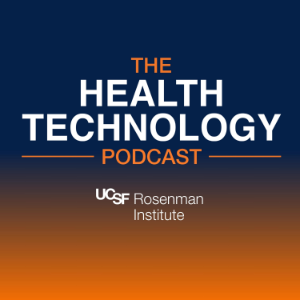
The Health Technology Podcast
Business & Economics Podcasts
Join the UCSF Rosenman Institute as we sit down with the most inspiring innovators in the healthtech industry. Our guests are creating technologies that save and improve patients’ lives. Listen in as they share their journeys, career insights, and invaluable lessons learned. Be inspired by the best and brightest in healthtech as they discuss their contributions to the future of healthcare.
Location:
San Francisco , CA
Description:
Join the UCSF Rosenman Institute as we sit down with the most inspiring innovators in the healthtech industry. Our guests are creating technologies that save and improve patients’ lives. Listen in as they share their journeys, career insights, and invaluable lessons learned. Be inspired by the best and brightest in healthtech as they discuss their contributions to the future of healthcare.
Twitter:
@RosenmanInst
Language:
English
The Hidden Workforce That Keeps Healthcare Running with Dr. Sunita Mutha
Duration:00:40:59
Dignity, Death & the End of Life Option Act
Duration:00:35:29
Curing Genetic Disease Before Life Begins with Tippi MacKenzie
Duration:00:36:56
Making Healthcare Human Again, with Troy Tazbaz
Duration:00:47:33
What Every Healthcare Leader Should Know, with Dr. Todd Brinton
Duration:00:36:17
Covered California: Jessica Altman on Access, Equity & Affordability
Duration:00:40:28
Every Second Counts: Cardiac Arrest Prevention Innovation with Sameer Jafri
Duration:00:40:11
What 2 Billion Data Points Can Tell Us: James Mault on Smarter Care
Duration:00:52:38
What Dying Teaches Us About Living: Insights from Ira Byock
Duration:00:47:03
Transforming Tribal Health: Roselyn Tso’s Game-Changing Vision
Duration:00:47:47
The Future of Palliative Care: Insights from Steve Pantilat
Duration:00:43:14
One-Click Pharmacy: Laura Jensen’s Innovative Mission
Duration:00:46:31
From Emergency Room to Mission Critical Leadership: Dr. Daniel Dworkis
Duration:00:45:21
Eyes on the Future: Hunter Cherwek’s Mission to End Preventable Blindness
Duration:00:43:37
From Loss to Time Best Inventions Award: Yoni Shtein’s Breakthrough in Healthcare
Duration:00:38:43
Rewiring the Brain: How Non-Invasive Tech is Tackling Anxiety, Insomnia & Obesity
Duration:00:38:33
From Zero to Unstoppable: Krista Drobac on Transforming Healthcare Delivery
Duration:00:45:40
Transforming Tragedy Into Compassionate Care: A Conversation with Dr. BJ Mille
Duration:00:52:55
Beyond GLP-1s | Sloan Saunders’ Holistic Vision for Sustainable Obesity Treatment
Duration:00:36:42
Breaking the Stigma | Joanna Strober & MIDI Health Revolutionizing Menopause and Women’s Midlife Care
Duration:00:36:32